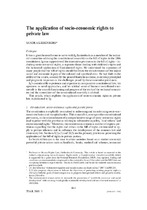| dc.contributor.author | Sandra, Liebenberg | |
| dc.date.accessioned | 2019-10-07T10:46:22Z | |
| dc.date.available | 2019-10-07T10:46:22Z | |
| dc.date.issued | 2008 | |
| dc.identifier.citation | Liebenberg, S. 2008. The application of socio-economic rights to private law. Journal of South African Law. 3, 464-480 | en_US |
| dc.identifier.uri | http://hdl.handle.net/10566/4996 | |
| dc.description.abstract | The constitution is explicitly committed to redressing and transforming socio-economic exclusion and marginalisation. This is manifest, amongst other constitutional provisions, in the entrenchment of a comprehensive range of socio-economic rights read together with the provisions relating to substantive equality, land reform and environmental rights.3 Moreover, the constitution contains a number of express provisions signalling that the rights and values in the bill of rights are intended to apply to private relations and to influence the development of the common law and customary law. Sections 8(1)-(3) and 39(2) are the primary provisions governing the application of the bill of rights to private parties. | en_US |
| dc.description.sponsorship | This article is based on material in the author’s Adjudicating Socio-Economic Rights under a Transformative Constitution (2008) which is supported by a grant from the National Research Foundation (NRF). | en_US |
| dc.language.iso | en | en_US |
| dc.publisher | Journal of South African Law | en_US |
| dc.subject | Socio-economic rights | en_US |
| dc.subject | Private law | en_US |
| dc.subject | Substantive equality | en_US |
| dc.subject | Transformation | en_US |
| dc.subject | Horizontal application | en_US |
| dc.title | The application of socio-economic rights to private law | en_US |
| dc.type | Article | en_US |

